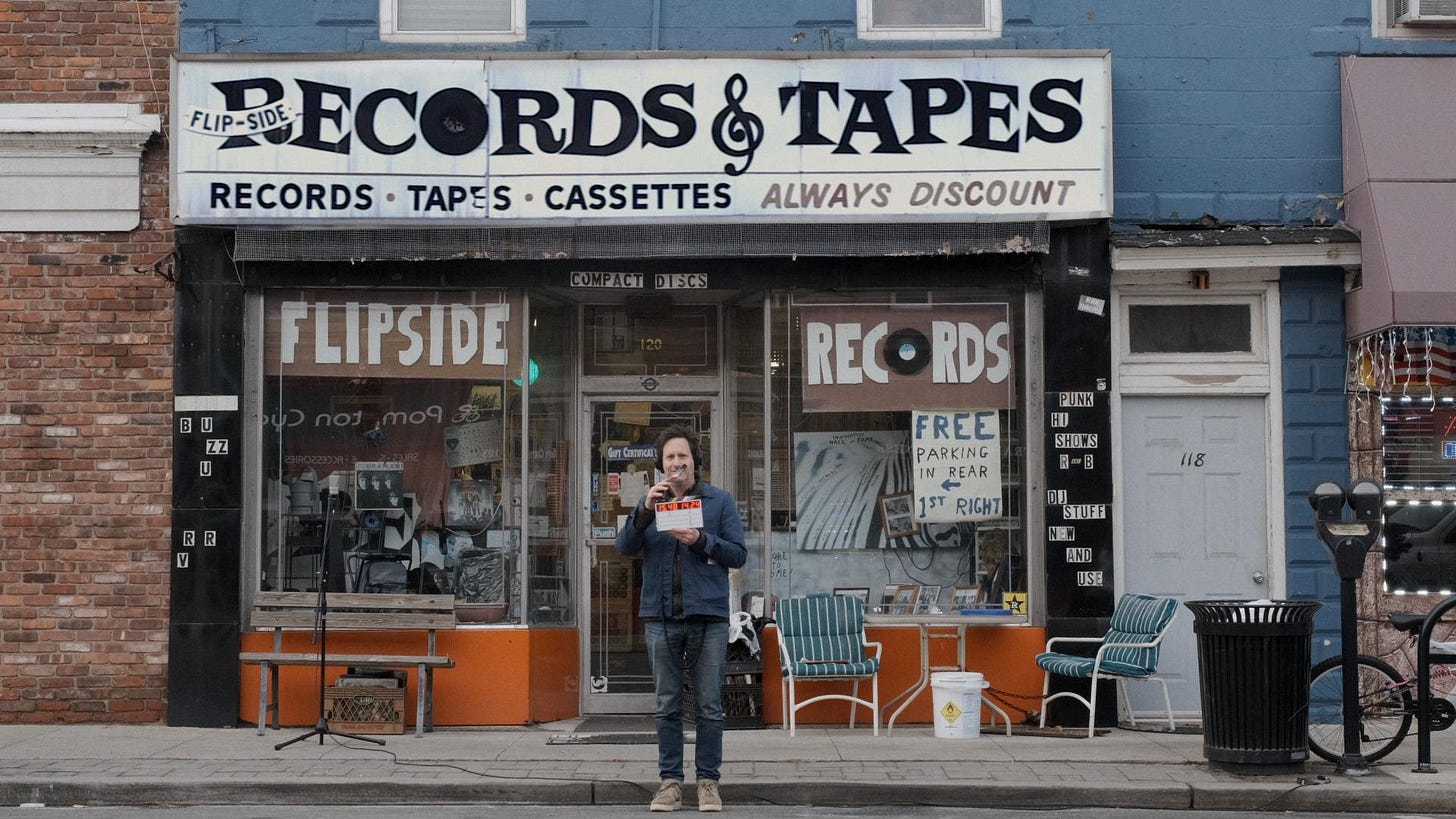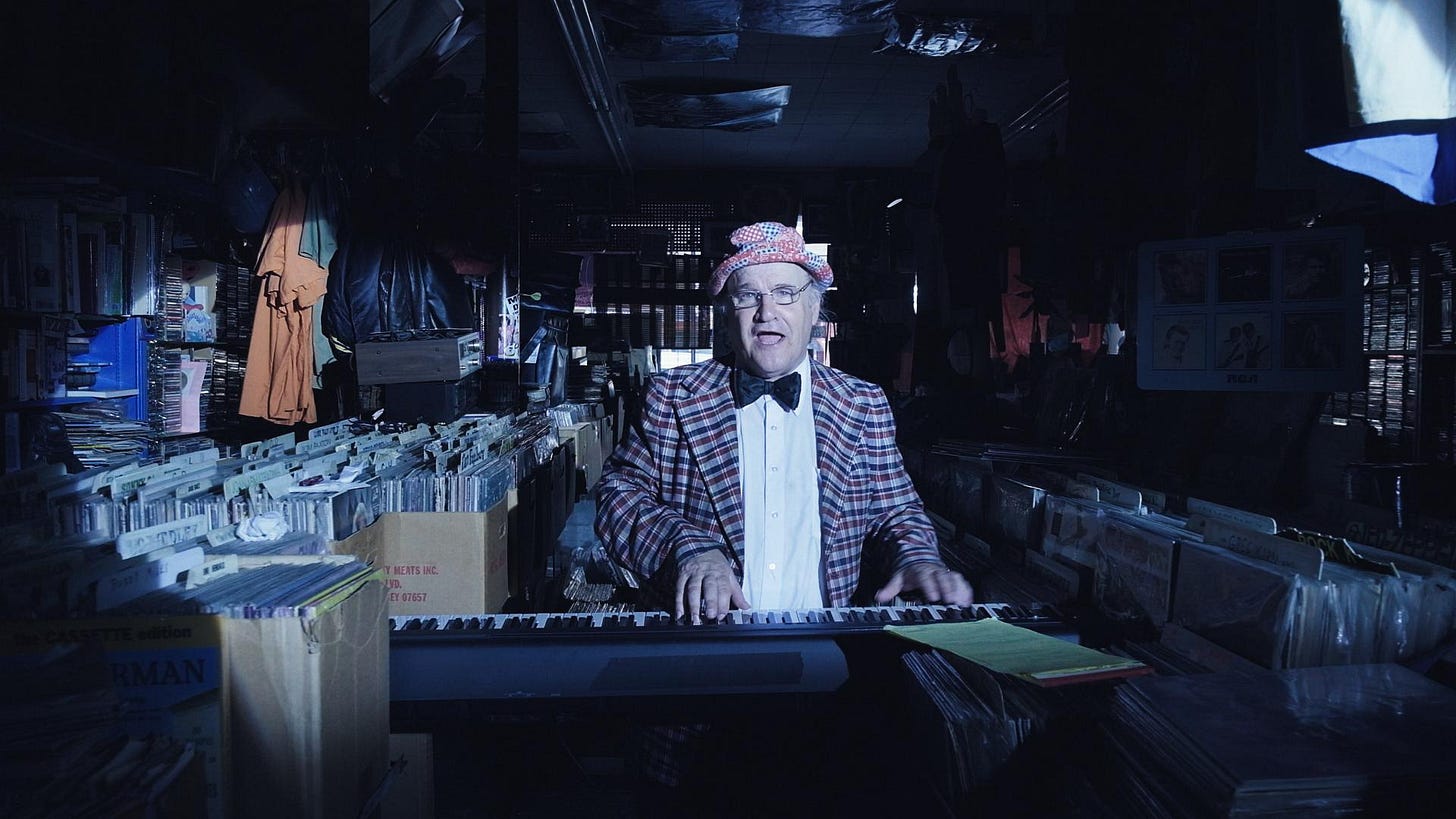On Chris Wilcha’s ‘Flipside’ | Bklyn Sounds 5/30/2024—6/5/2024
A documentary about a record store, life's works and steering a creative path forward + Shows: 'Eric Dolphy: Freedom of Sound' / STEFA* / Photay with Celia Hollander & Robbie Lee / Villalobos / more
What’s in “a life’s work” and how do you recognize yourself on the path towards it? I’ve spent too much of my adulthood asking these questions, only recently coming up with what resembles a reasoned answer. Mostly, the ideal of a sustaining, purposeful, coherent, ethical and (hopefully) creative life has only flickered like a specter, the topic of unguarded conversations with loved ones, therapists, and maybe the occasional trusted colleague. These exchanges took place before children, before careers (failed, successful, accidental), and before aging was supposed to suppress grand aspirations. Largely, such flickers proved unsustainable, even if their residual radiance has also never gone totally dark.
Few coincidences speak to the intellectual and circumstantial privileges I’ve been afforded than the fact that one such former trusted colleague, Chris Wilcha, kind of ended up making a movie about this subject of life’s work. Wilcha’s remarkable new documentary, Flipside, is a tapestry of stories, none of which he was originally capable of completing due to a variety of IRL circumstances. It sews all these unfinished projects together into a moving midlife memoir about striving to realize one’s creative purpose. The film is Wilcha’s own biography, for sure, but it also tells the stories of an impressive list of characters — screenwriter David Milch, This American Life creator Ira Glass, jazz photographer Herman Leonard, writer and radio host Starlee Kine, and ‘80s UHF cult-hero Uncle Floyd — all of whom played parts in Wilcha’s journey through failure. But at the center of the tale is Dan Dondiegom, owner of Flipside Records in Pompton Lakes, NJ, where he worked as a teenager.
As it blends together all their narratives, Flipside confronts success and failure, commerce and storytelling, opportunism and idealism, entropy and anomie, navigating the story with Sebald-ian logic. The film is also a love-letter to the Gen-X romantics who never eradicated the no-sell-out gene from their DNA — even as we went into advertising and climbed corporate ladders, justifying it as a means to an end. That this self-effacing chronicle about aging with as much grace as modern life can muster, ends on a note of hope rather than despair is one of Flipside’s triumphs. That the film even got made — its decade of scattered footage which Wilcha’s film-making community believed and willed towards completion — is another.
Chris and I first met in the late ‘90s while working together at the Columbia House Record and Tape Club, an experience he turned into his 1999 indie-hit doc, The Target Shoots First. As Flipside tells, Wilcha used that film to carve out a niche as a documentary filmmaker of note — most notably, winning awards for helping bring This American Life to television — but soon ebbed into a life of making high-end television commercials, while starting and abandoning a string of labor-of-love projects. One of Flipside’s primary tensions is “trying to find the balance between the art and the commerce,” Wilcha told me when I interviewed him about the movie. “What’s gonna help you make a living — and then what do you want to do that you feel connected with, [that] has meaning?” At some point, his own sense of that balance “collapsed.”
Flipside began as an early COVID project, when Wilcha and a few colleagues began looking for things to work on at home during lockdown, briefing one another on footage they had in the archives. In 2013, Wilcha began making a documentary about Flipside Records, his “filthy fountain of youth,” which was then experiencing a pre-vinyl-boom downturn. As Chris always does, he started by thinking big. “I was gonna try to save the place, camp out there for maybe as long as a month, get a website up, post on social media. But the thing is, my life never allowed for that. I didn’t want to do something fake, but I genuinely did want to help Dan.” So over the next half-decade, Wilcha would shoot at Flipside occasionally, once or twice a year, mostly while visiting his parents who still lived nearby. Those visits included their own side-trips down memory lane, with his parents’ loudly voiced desire for Chris, a pack-rat since his teens, to get his shit out of the house, a process of self-examination the film-maker also began documenting. So when in the Spring 2020, Wilcha shared this nascent idea related to a record-store documentary and memory with his colleagues, something stuck.
Wilcha admits that “The only reason [Flipside] got made was the community held up a mirror and said ‘There’s something here. We don’t know exactly what it is, but we are feeling it.’” The editor Claire Ave’Lallemant spent nearly a year rifling through old hard-drives. The Emmy Award-winning editor Joe Beshenkovsky soon joined in, and began stringing together echoing stories of creative lives which Wilcha had at some point eloquently captured, but was never quite capable of bringing finish line. (Beshenkovsky ended up being one of Flipside’s executive producers, alongside Judd Apatow.) Wilcha’s old friend, the musician/writer Adam Samuel Goldman helped write a treatment that brought the film-maker’s own middle-age questions to the fore. Flipside’s “cumulative chorus of voices” began singing together, hitting a strange, funny and heart-wrenching note.
“There came this moment of examining,” Wilcha says of the paralyzing physical and psychic content in overcrowded basements, in the long productive careers of his subjects, and in the hours of his own unused footage that was previously collecting digital dust. “What do you want to take with you into the next phase of your life? It first started out being about actual stuff — ‘do I need this issue of, I dunno, The Big Takeover from 1994 or this collection of Maximum Rock and Roll ‘zines from 1986?’ But then it became about purging ideas as much as objects and artifacts. What’s useful? What do you want to leave behind?” Interrogating a life's work, it seems, can not happen without first interrogating its accumulation.
But based on Flipside’s festival reviews and early word-of-mouth, it might not mean that you need all that midlife baggage to actually have its philosophical outlook reverberate.
“I've held post-screening conversations with people who are college-age or just out of school, and gotten some really lovely DMs and messages,” Wilcha told me. “They're saying, ‘I am contemplating how to make a life, how to make a living. And I'm thinking about all these questions too.’ It didn't just feel like it was resonating with only aging Gen Xers — everyone has these instincts toward figuring out work that is meaningful.”
We’re generally taught that it’s never too early to start contemplating a life’s work. What all the different accounts that make up Flipside reveal is the value of continuing to strive towards figuring it out, no matter how fraught with frustration that path may be. And that it’s never too late to realize that your life’s work may be closer than it appears.
Flipside opens at IFC on Friday 5/31. Special screenings on Fri 5/31, Sat 6/1 and Sun 6/2 will be followed by a Q&A with director Chris Wilcha; Friday and Sunday, Q&As will be moderated by Ira Glass, and on Saturday by Kelefa Sanneh (on view through at least June 5th, check for showing times, @ IFC Center, Manhattan - $15-$20)
This Week’s Shows:
Though Kaleta & Super Yamba Band are steady road-dogs, it’s been a minute since the great NYC-based highlife guitar player (once of Fela’s Egypt 80) and his backing group of Afro-funk/-rock/-beat compadres have actually joined forces in the city. Without their occasional front-person, the Yambateers are a mighty power unto themselves; but with him, this is simply one of the best live dance bands in Bklyn. Co-headlining this evening alongside the Senegal-originating roots reggae of Meta & the Cornerstones. Also: DJ Gringo. (Thurs 5/30, 8p @ Brooklyn Bowl, Williamsburg - $22)
Vocalist-guitarist-poet Rose Tang’s political activity comes from experience: as a young student, she was present at Beijing’s Tiananmen Square in May and June of 1989 when the student protests were crushed by China’s military. Even before October 7th, Tang has been active in Pro-Palestinean demonstrations, and the From Tiananmen to Palestine: Say NO to State Violence benefit she has helped put together, commemorating the 35th anniversary of the Tiananmen Massacre, draws a direct line between the two. Among the evening’s performers will be one of Tang’s bands, the quartet On The Way, and the jaimie branch tribute band helmed by jaimie’s nephew Chris Branch on drums. (jaimie and Rose were dear friends). (Thurs 5/30, 8p @ 360 Record Shop, Red Hook - $20/NOTAFLOF)
MUSIC-BASED COMMUNITY-BUILDING! Though GENG PTP/King Vision Ultra has always been a community-minded cat, of late, the label-running DJ-producer-organizer has been using the crew at PTP (formerly Purple Tape Pedigree, now Protect The Peace) and its various resources to go all-in on coalition-building, archive-channeling and collaboration. This week Geng and the PTP family, including Brandon King (DJ subt.le) and Timmhotep Aku (writer, host of NTS’s Subject to Change), are hosting two free, all-ages dialogues on these subjects: Thursday’s will focus on the King Vision Ultra/Algiers collaborative mixtape, Shook World, as a “template for community as praxis.” (Thurs 5/30, 7p @ Art Cake, Sunset Park - FREE ALL AGES). Saturday, the newly formed PTP Archival Coalition will team-up with Hoodwear Diaries to host a more general roundtable on collaboration and documenting culture, and will include screenings of rare video documents from throughout the history of NYC’s various underground sounds. Highest Recommendation for the visionary futurist set. (Sat 6/1, 6p @ Lichen, Ridgewood - FREE ALL AGES)
Keep reading with a 7-day free trial
Subscribe to Dada Strain to keep reading this post and get 7 days of free access to the full post archives.





